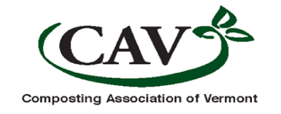The Composting Association of Vermont
The Value of Compost
CAV was founded in 2002 with the support of the Vermont Sustainable Jobs Fund and the Agency of Natural Resources Department of Environmental Conservation Waste Management Division (ANR/DEC) with the purpose and vision to build a thriving composting sector in Vermont. CAV promotes the production and use of compost as a vital link between soil health and sustainable agriculture and communities. As a 501(c)(3) non-profit we rely on a cooperative, stakeholder driven approach in our work.
Natasha Duarte joined CAV as Director in April 2017 and represents CAV in policy initiatives, and coordinates with partners for outreach and education projects. Natasha comes to CAV after serving for almost a decade as the Director of the International Society of Ethnobiology (ISE), a non-profit based in Bristol, VT dedicated to preserving the vital links between human societies and the natural world. During her tenure as the ISE Director, Natasha strengthened and professionalized the Society’s administrative and programmatic capacity. Prior to this, she was a Research Soil Scientist for the USDA Forest Service. As a member of the Forest Sensitivity Mapping Group, she assessed the effects of acid rain on forest ecosystems and tree health, focusing on individual sites throughout New England, New York, West Virginia, Tennessee, and California. Community scale composting was the cornerstone of Natasha’s Peace Corps work in Senegal, West Africa, where she helped farmers reclaim land from termite mounds and turn the poorest areas of their fields into the most productive. Natasha is also the Chair of the Farm to Plate Food Cycle Coalition. She earned an M.S. in Soil Science from N.C. State University and a B.A. in Anthropology from the University of Vermont.
CAV members provide hundreds of hours in-kind each year, contributing policy, planning, site management, product quality and composting expertise, in addition to decades of experience within the food system and management of organic residuals.
Through strategic relationships with many other stakeholder groups, CAV is expanding the composting network, markets for end uses of compost, and a knowledge base about composting within the state of Vermont. CAV conducts projects and advocacy on emerging trends, issues and technology.
Keeps valuable carbon in soils where it improves soil and plant health for multiple social and environmental benefits. Increased soil carbon helps:
Re-establish a robust Soil Food Web ecosystem
Filter and store stormwater runoff for cleaner streams rivers and lakes
Absorb and store water in soil to reduce erosion and flooding, recharge groundwater and improve drought resilience
Improve crop health and decrease need for expensive agricultural inputs
Communities adapt to rapid changes in the climate and extreme weather events
Contributes to vibrant local economies, with sustainable businesses and jobs, a strengthened local food system, and by using organic byproducts as resources rather than landfilling them as ‘waste’.
Results in carbon-literate communities, experienced in the use of science-based knowledge to effectively compost community generated organic residuals.
The issues facing the production of compost and efforts to increase acceptance and widespread use of compost are complex, requiring diverse partnerships and influencing statewide policy-making.
CAV Members
Stakeholder groups that CAV works with include:
Composters
Black Dirt Farm (Stannard, VT)
Champlain Valley Compost, Co. (Charlotte, VT)
Cookeville Compost at Sandberg Farm (Corinth, VT)
Green Mountain Compost (Williston, VT)
Grow Compost of Vermont (Moretown, VT)
Lamoille Soil (Johnson, VT)
TAM Organics (Bennington, VT)
Vermont Compost Company (Montpelier, VT)
Vermont Natural Ag Products, Inc. (Middlebury, VT)
Windham County Solid Waste Management District Composting Facility (Brattleboro, VT)
Solid Waste Management Entities:
Addison County Solid Waste Management District (ACSWMD)
Bennington County Solid Waste Alliance (BCSWA)
Chittenden Solid Waste District (CSWD)
Central Vermont Solid Waste Management District (CVSWMD)
Lamoille Regional Solid Waste Management District (LRSWMD)
Northeast Kingdom Waste Management District (NEKWMD)
Northwest Solid Waste District (NWSWD)
Vermont Agency of Natural Resources
Generators of compostable materials
Solid Waste Management Districts/Entities
Watershed protection entities
Compost producers & facility operators
Educators and researchers
Legislative groups & regulatory agencies
UVM Extension
UVM Plant and Soil Science Department
Sustainable Agriculture Research and Education
Farm to Plate
Vermont Sustainable Jobs Fund
and many others



